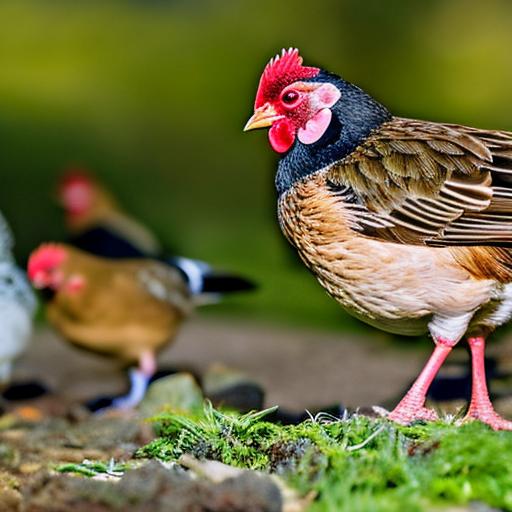Urban chicken keeping, also known as backyard chicken keeping, is the practice of raising chickens in residential areas, particularly in urban and suburban settings. It has become increasingly popular in recent years as more people are becoming interested in sustainable living and self-sufficiency. Keeping chickens in your front garden allows you to have a constant supply of fresh eggs, natural pest control, and fertilizer for your garden. In addition, chickens can be great pets and provide entertainment for the whole family.
This article will cover the various aspects of urban chicken keeping, including the benefits, legal considerations, choosing the right breed, housing and shelter requirements, feeding and watering, health and hygiene, managing noise and odor, and integrating chickens into your front garden design.
Key Takeaways
- Urban chicken keeping is becoming increasingly popular as people seek to live more sustainably and connect with their food sources.
- Keeping chickens in your front garden can provide a range of benefits, including fresh eggs, natural pest control, and fertilizer for your garden.
- Before starting an urban chicken keeping project, it’s important to research local laws and regulations to ensure that you are in compliance.
- Choosing the right chicken breed for your front garden depends on factors such as climate, space, and temperament.
- Housing and shelter requirements for front garden chickens include providing a secure coop and run, as well as protection from predators and the elements.
Benefits of keeping chickens in your front garden
One of the main benefits of keeping chickens in your front garden is having a constant supply of fresh eggs. There is nothing quite like collecting eggs from your own backyard and knowing exactly where they came from. In addition to being fresher and tastier than store-bought eggs, backyard eggs are also more nutritious as they are laid by chickens that have access to a varied diet.
Chickens also provide natural pest control for your garden. They love to eat insects such as slugs, snails, and beetles, which can be harmful to your plants. By allowing your chickens to free-range in your front garden, you can reduce the need for chemical pesticides and create a healthier environment for both your plants and your family.
Furthermore, chickens produce high-quality fertilizer in the form of their droppings. Chicken manure is rich in nitrogen, phosphorus, and potassium, which are essential nutrients for plant growth. By composting chicken manure and using it as fertilizer in your garden, you can improve soil fertility and promote healthy plant growth.
Aside from their practical benefits, chickens can also be great pets and provide entertainment. They have unique personalities and can be quite affectionate towards their owners. Watching them scratch and peck around the garden can be a source of joy and relaxation. Children especially enjoy interacting with chickens and learning about their behaviors and life cycle.
Legal considerations for urban chicken keeping
Before getting chickens for your front garden, it is important to research and understand the local regulations regarding urban chicken keeping. Laws regarding chickens vary by city and state, so it is crucial to know what is allowed in your area.
Common restrictions include the number of chickens allowed, coop placement, and noise regulations. Some cities may have limits on the number of chickens you can keep, typically ranging from three to six. Coop placement may also be regulated, with requirements such as setbacks from property lines or restrictions on coop size.
Noise regulations are another important consideration. Roosters are known for their loud crowing, which can disturb neighbors, especially in densely populated areas. Many cities prohibit keeping roosters altogether, while others may have specific noise restrictions that must be followed.
It is essential to check with your local government or zoning department to ensure that you are in compliance with all regulations before getting chickens for your front garden.
Choosing the right chicken breed for your front garden
When choosing a chicken breed for your front garden, there are several factors to consider. One of the most important factors is egg production. If you are primarily interested in having a steady supply of fresh eggs, you will want to choose a breed that is known for its egg-laying abilities. Some popular breeds for egg production include Rhode Island Reds, Leghorns, and Australorps.
Temperament is another important consideration, especially if you have children or plan to interact with your chickens regularly. Some breeds are known to be more docile and friendly, while others can be more skittish or aggressive. It is important to choose a breed that matches your lifestyle and preferences.
Climate adaptability is also a factor to consider. Some breeds are better suited for cold climates, while others are more heat-tolerant. If you live in an area with extreme temperatures, it is important to choose a breed that can thrive in those conditions.
Additionally, consider the size of your front garden and the space available for your chickens. Some breeds are more suited for small spaces and can tolerate confinement better than others. Bantam breeds, such as Silkies or Polish, are smaller in size and require less space compared to larger breeds.
By considering these factors, you can choose the right chicken breed that will thrive in your front garden and meet your specific needs and preferences.
Housing and shelter requirements for front garden chickens
Chickens require a secure coop and run to protect them from predators and provide shelter from the elements. The coop should be well-constructed and predator-proof, with sturdy walls, a secure roof, and strong wire mesh to prevent entry by predators such as raccoons, foxes, or rats.
The coop should also provide adequate space for the number of chickens you plan to keep. As a general guideline, each chicken should have at least 4 square feet of indoor space in the coop and 10 square feet of outdoor space in the run. Providing enough space ensures that chickens can move around comfortably and reduces the risk of aggression or stress-related behaviors.
It is important to clean the coop regularly to maintain good hygiene and prevent the buildup of waste. Chicken droppings should be removed regularly, and fresh bedding should be added to keep the coop clean and odor-free. Regular cleaning also helps prevent the spread of diseases and parasites.
In addition to the coop, chickens also need access to a secure outdoor run where they can stretch their legs and engage in natural behaviors such as scratching and dust bathing. The run should be covered with wire mesh to prevent entry by predators and should be large enough to allow chickens to move around freely.
By providing a secure and comfortable housing and shelter for your front garden chickens, you can ensure their safety and well-being.
Feeding and watering your front garden chickens

Proper nutrition is essential for the health and productivity of your front garden chickens. Chickens require a balanced diet that includes a combination of commercial feed, kitchen scraps, and garden waste.
Commercial chicken feed is formulated to provide all the essential nutrients that chickens need. It is available in different forms, including pellets, crumbles, and mash. Choose a feed that is appropriate for the age and type of chickens you have. Starter feed is suitable for chicks up to 6 weeks old, while grower feed is for young chickens between 6 weeks and 16 weeks old. Layer feed is formulated for adult hens that are laying eggs.
In addition to commercial feed, chickens can also eat kitchen scraps such as vegetable peels, fruit scraps, and bread. However, it is important to avoid feeding them anything that is toxic or harmful to their health, such as chocolate, onions, or avocado.
Garden waste such as weeds, grass clippings, and fallen leaves can also be fed to chickens. They will happily eat these greens and turn them into nutrient-rich manure for your garden.
Fresh water should be available to chickens at all times. It is important to provide clean water in a container that cannot be easily tipped over or contaminated by droppings. In cold weather, it may be necessary to use a heated waterer to prevent freezing.
By providing a balanced diet and fresh water, you can ensure the health and productivity of your front garden chickens.
Health and hygiene considerations for urban chicken keeping
Chickens, like any other animals, can get sick and require regular check-ups from a veterinarian. It is important to monitor the health of your chickens and seek veterinary care if you notice any signs of illness or abnormal behavior.
Common health issues in chickens include mites, respiratory infections, and egg-laying problems. Mites are tiny parasites that can cause itching, feather loss, and anemia in chickens. Regularly inspect your chickens for signs of mites and treat them promptly if necessary.
Respiratory infections can be caused by bacteria or viruses and can result in symptoms such as coughing, sneezing, and difficulty breathing. Good ventilation in the coop and clean bedding can help prevent respiratory infections. If you suspect that your chickens have a respiratory infection, consult a veterinarian for proper diagnosis and treatment.
Egg-laying problems can occur in hens and may include issues such as soft-shelled eggs, egg binding, or prolapse. Providing a balanced diet, adequate calcium supplementation, and a stress-free environment can help prevent these problems. If you notice any abnormalities in your hens’ egg-laying behavior, consult a veterinarian for guidance.
Maintaining good hygiene is also important for the health of your front garden chickens. Regularly clean the coop and remove droppings to prevent the buildup of waste and the spread of diseases. Provide clean bedding and ensure that the coop is well-ventilated to reduce moisture and ammonia levels.
By monitoring the health of your chickens, practicing good hygiene, and seeking veterinary care when necessary, you can ensure the well-being of your front garden flock.
Managing noise and odor from front garden chickens
Noise and odor are common concerns when it comes to keeping chickens in residential areas. However, with proper management, these concerns can be minimized.
To manage noise, it is important to choose chicken breeds that are known for being quieter. Some breeds, such as Silkies or Sussex, are known for their calm and quiet nature. On the other hand, breeds such as Leghorns or Ameraucanas tend to be more vocal. If noise is a concern, it is best to avoid keeping roosters, as they are the ones that typically crow loudly.
Proper coop maintenance and waste management can also help reduce odor. Regularly cleaning the coop and removing droppings will prevent the buildup of waste and minimize odor. Adding bedding materials such as straw or wood shavings can help absorb moisture and reduce ammonia levels.
Composting chicken manure can also help manage odor. Chicken manure is an excellent source of nitrogen for composting, but it should be composted properly to prevent odor and pathogens. Composting chicken manure with carbon-rich materials such as leaves or straw will help create a balanced compost that is odor-free and safe to use in your garden.
By choosing quieter breeds, practicing proper coop maintenance, and managing waste effectively, you can minimize noise and odor from your front garden chickens.
Integrating chickens into your front garden design
Chickens can be integrated into your front garden design in various ways, adding both beauty and functionality to your outdoor space.
One way to incorporate chickens into your garden is by using their manure as fertilizer. Chicken manure is rich in nutrients and can be composted to create a nutrient-rich soil amendment. By composting chicken manure and using it in your garden, you can improve soil fertility and promote healthy plant growth.
Another way to integrate chickens into your front garden is by allowing them to free-range in designated areas. Chickens love to scratch and peck around for insects and greens, which can help control pests and weeds in your garden. However, it is important to protect sensitive plants or areas that you do not want chickens to access.
You can also house your chickens in attractive coops that complement your garden design. There are many creative coop designs available that range from rustic to modern, allowing you to choose one that suits your style and preferences. By incorporating the coop into your garden design, you can create a cohesive and visually appealing outdoor space.
By integrating chickens into your front garden design, you can create a harmonious and functional outdoor space that benefits both you and your chickens.
Is keeping chickens in your front garden right for you?
Keeping chickens in your front garden can be a rewarding and fulfilling experience. It provides numerous benefits such as fresh eggs, natural pest control, and fertilizer for your garden. Chickens can also be great pets and provide entertainment for the whole family.
However, it is important to do your research and consider your lifestyle before getting chickens. Understanding the legal considerations, choosing the right breed, providing proper housing and shelter, feeding and watering them correctly, maintaining their health and hygiene, managing noise and odor, and integrating them into your front garden design are all important factors to consider.
By taking the time to educate yourself and plan accordingly, you can create a successful and enjoyable urban chicken keeping experience in your front garden.
We would love to hear about your experiences with urban chicken keeping in the comments below! Share your tips, challenges, and success stories with our community.
If you’re considering keeping chickens in your front garden, you may also be interested in exploring the benefits of having a farmhouse chicken coop. This article from Poultry Wizard provides valuable insights into creating a cozy and functional space for your feathered friends. From design tips to essential features, the farmhouse chicken coop guide offers practical advice for ensuring the comfort and well-being of your chickens. To learn more about this topic, check out the article here. Additionally, if you’re curious about whether guinea fowl can live with chickens, Poultry Wizard has another informative article that explores this topic. You can find it here. Lastly, if you’re not ready to commit to building your own coop, Poultry Wizard also offers a unique solution with their rent-a-chicken coop service. Discover more about this convenient option here.
FAQs
Can you keep chickens in your front garden?
Yes, you can keep chickens in your front garden as long as you follow certain rules and regulations.
What are the rules and regulations for keeping chickens in your front garden?
The rules and regulations for keeping chickens in your front garden vary depending on your location. You should check with your local council to find out what rules apply to you.
How many chickens can you keep in your front garden?
The number of chickens you can keep in your front garden depends on the size of your garden and the rules and regulations in your area. Generally, you can keep up to six chickens in a standard-sized garden.
What do you need to keep chickens in your front garden?
To keep chickens in your front garden, you will need a secure coop and run, food and water containers, and bedding material. You will also need to provide your chickens with regular care and attention.
What are the benefits of keeping chickens in your front garden?
Keeping chickens in your front garden can provide you with fresh eggs, help control pests in your garden, and provide you with a source of fertilizer for your plants. It can also be a fun and educational experience for children.
What are the potential drawbacks of keeping chickens in your front garden?
Keeping chickens in your front garden can be noisy and may disturb your neighbors. It can also attract predators such as foxes and rats. Additionally, chickens require regular care and attention, which can be time-consuming.
Meet Walter, the feathered-friend fanatic of Florida! Nestled in the sunshine state, Walter struts through life with his feathered companions, clucking his way to happiness. With a coop that’s fancier than a five-star hotel, he’s the Don Juan of the chicken world. When he’s not teaching his hens to do the cha-cha, you’ll find him in a heated debate with his prized rooster, Sir Clucks-a-Lot. Walter’s poultry passion is no yolk; he’s the sunny-side-up guy you never knew you needed in your flock of friends!







